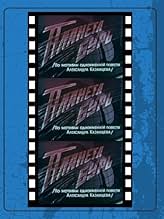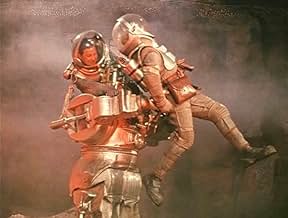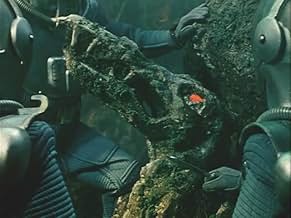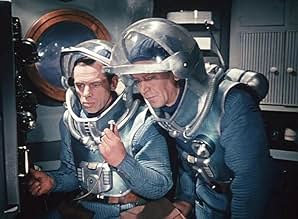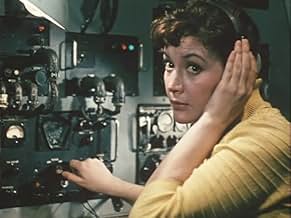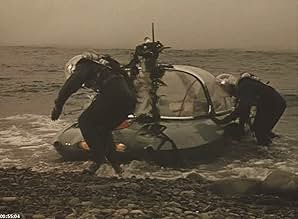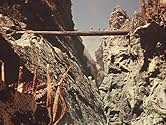VALUTAZIONE IMDb
6,3/10
1565
LA TUA VALUTAZIONE
Aggiungi una trama nella tua linguaCosmonauts land on the planet Venus. However, they find themselves in danger from the voracious monsters they find on it.Cosmonauts land on the planet Venus. However, they find themselves in danger from the voracious monsters they find on it.Cosmonauts land on the planet Venus. However, they find themselves in danger from the voracious monsters they find on it.
- Regia
- Sceneggiatura
- Star
Recensioni in evidenza
The russian language version is rare, but well worth seeing. If you're really curious, you can see the American version which was retitled "Voyage to the prehistoric planet" and released in 1966. Back in the early 1960s, when this film was made, the Soviets had focused thier space program on Venus. In fact, they were the first to send probes into the atmosphere, land successfully, and return pictures from the surface. It's no wonder they were inspired to produce an extravagant adventure, based on the promise of thier exploration. The story is basic and straight forward, about an expedition to the planet Venus, but the science is flawed. They encounter oceans, flooding rains, and animal life. When this film was produced, we were just beginning to discover the truth about Venus. A surface temperature at the melting point of lead. A poisinous atmospere, with crushing pressure hundreds of times as heavy as ours. No water, or oxygen, and sulfuric acid in the clouds. If you're lucky enough to run across this film, forget all that, suspend you disbelief, and enjoy this rare classic gem.
10timayres
I saw this in my childhood and took years to track it down again since I saw it under one of its two confusing Roger Corman english-language re-edits [Voyage to the Prehistoric Planet with Basil Rathbone added, and Voyage to the Planet of Prehistoric Women, with mermaids scenes directed by Peter Bogdonavich.] Finally able to track down the original Russian version recently, I was able to fully appreciate the ambitious scope and production values. The forest is truly primeval in its detailed beauty, Robot John both heroic and sad in his dedication, and the ending poetic and lyrical. Non-U.S. science fiction films are doubly exotic, and this one is classic fare.
I'm of the opinion that film is powerful, powerful enough that large segments of our imagination is guided by cinematic relationships. That even the nature of reasoning is affected, even as deeply as how we reinvent practical logic. There are lots of examples to show and arguments to be made -- they are in a collection I am incubating.
Science fiction is a special case, at once more obvious. Not all as subtle as what I study. But surely it had as profound an effect on daily lives.
To understand this film, you need to know some history. Alas, many readers will not appreciate the cold war that was the overriding impetus for the two largest political entities from the 50s through the 80s.
Some dates for you. In 56, the US saw "Forbidden Planet," with a superintelligent robot, space travel and mind augmentation. It was based on Shakespeare's most interesting play and is still among the best scifi films.
In 57, Russia launched a satellite and declared that they "owned" space (and would put nuclear bombs over the US ready to "drop"). Also, that soon, they would have men in space.
In 58 one of the most successful Russian filmmakers (Klushantsev) made a film about "cosmonauts" and space travel that was enormously successful with the Russian public (and their captive peoples). That film was the beginning of a deeper than usual partnership between Klushantsev and the propaganda arm of the Kremlin.
In 1960, an unknown in East Germany made a film (Road to the Stars) about cosmonauts on Venus. It was a runaway hit. In the following year, Kennedy made his famous pledge to put an American on the moon by the end of the decade.
The Soviet moon program had some catastrophic disasters, in large part resulting from lies told to the old Stalin regime by Soviet scientists working on ballistic missiles supposedly (but not really) capable of destroying the US. Khrushchev had these scientists destroyed or imprisoned. That meant no moon program.
But the people already were convinced that Venus was the prize, so the space propagandists seized on this and retooled their manned program as a race to Venus, forget the moon. As a consequence, Klushantsev was given a (for the times and conditions) vast budget and told to make a film of the heroic Soviet nation exploring Venus. This he did in the film you'll see here if you can find it.
Our intrepid crew is asked to make the Soviet people proud, a promise they come back to a few times. There's a robot, clearly stolen from "Forbidden Planet."
The thing revolves around there being life on Venus. Just as they take off, they find proof that the life consisted of humans. Afterthey leave, we see a beautiful woman appear. Then, as the spacecraft flies home, we have a few minutes of a Soviet heroes song in that militant, deliberately fake spontaneous joyous tone of the times.
The effects developed by this team would be used in strange circumstances for the next 8 years. This crew filmed fake footage of real spaceflights. The Kremlin was never so bold as to fake a success when everyone knew the missions ended in fiery death. But they did decorate their successes with these true-fake movies. The most famous was the 65 spacewalk of Leonov, wonderfully believable until you wonder who is holding the camera. Oddly, the propagandists assumed that the camera eye was such a magical omnipresence that no one would ask.
Anyway, this film was somehow procured by the infamous Roger Corman. He shortened it and dubbed in English. He substituted the blank female (who says in an orbital craft) with an even more blank female. One wonders why; Faith Domergue had been hot 15 years earlier but here is wallpaper. And he adds an earthside leader who radios a few times, played by the already embarrassing Basil Rathbone. Something interesting could be said about his Sherlock Holmes here.
Kubrick's 1968 2001, used many conventions from this shop, even when they went against the science of the thing. And ever since, on through "Star Wars," we have that single vision of what space SHOULD look like.
Ted's Evaluation -- 2 of 3: Has some interesting elements.
Science fiction is a special case, at once more obvious. Not all as subtle as what I study. But surely it had as profound an effect on daily lives.
To understand this film, you need to know some history. Alas, many readers will not appreciate the cold war that was the overriding impetus for the two largest political entities from the 50s through the 80s.
Some dates for you. In 56, the US saw "Forbidden Planet," with a superintelligent robot, space travel and mind augmentation. It was based on Shakespeare's most interesting play and is still among the best scifi films.
In 57, Russia launched a satellite and declared that they "owned" space (and would put nuclear bombs over the US ready to "drop"). Also, that soon, they would have men in space.
In 58 one of the most successful Russian filmmakers (Klushantsev) made a film about "cosmonauts" and space travel that was enormously successful with the Russian public (and their captive peoples). That film was the beginning of a deeper than usual partnership between Klushantsev and the propaganda arm of the Kremlin.
In 1960, an unknown in East Germany made a film (Road to the Stars) about cosmonauts on Venus. It was a runaway hit. In the following year, Kennedy made his famous pledge to put an American on the moon by the end of the decade.
The Soviet moon program had some catastrophic disasters, in large part resulting from lies told to the old Stalin regime by Soviet scientists working on ballistic missiles supposedly (but not really) capable of destroying the US. Khrushchev had these scientists destroyed or imprisoned. That meant no moon program.
But the people already were convinced that Venus was the prize, so the space propagandists seized on this and retooled their manned program as a race to Venus, forget the moon. As a consequence, Klushantsev was given a (for the times and conditions) vast budget and told to make a film of the heroic Soviet nation exploring Venus. This he did in the film you'll see here if you can find it.
Our intrepid crew is asked to make the Soviet people proud, a promise they come back to a few times. There's a robot, clearly stolen from "Forbidden Planet."
The thing revolves around there being life on Venus. Just as they take off, they find proof that the life consisted of humans. Afterthey leave, we see a beautiful woman appear. Then, as the spacecraft flies home, we have a few minutes of a Soviet heroes song in that militant, deliberately fake spontaneous joyous tone of the times.
The effects developed by this team would be used in strange circumstances for the next 8 years. This crew filmed fake footage of real spaceflights. The Kremlin was never so bold as to fake a success when everyone knew the missions ended in fiery death. But they did decorate their successes with these true-fake movies. The most famous was the 65 spacewalk of Leonov, wonderfully believable until you wonder who is holding the camera. Oddly, the propagandists assumed that the camera eye was such a magical omnipresence that no one would ask.
Anyway, this film was somehow procured by the infamous Roger Corman. He shortened it and dubbed in English. He substituted the blank female (who says in an orbital craft) with an even more blank female. One wonders why; Faith Domergue had been hot 15 years earlier but here is wallpaper. And he adds an earthside leader who radios a few times, played by the already embarrassing Basil Rathbone. Something interesting could be said about his Sherlock Holmes here.
Kubrick's 1968 2001, used many conventions from this shop, even when they went against the science of the thing. And ever since, on through "Star Wars," we have that single vision of what space SHOULD look like.
Ted's Evaluation -- 2 of 3: Has some interesting elements.
If one wants to learn some Russian (which I would like to do if I could find the time), then this film would give some insights.
I bought the version from Sinister Cinema which seems to be missing the first half and so it starts with the cosmonauts discussing a tragic collision in space as they prepare to embark on a trip to Venus. It is in Russian with English subtitles and the special effects and the background music are both awesome. The story is pretty straight forward about a Russian expedition to the planet Venus, their encounter with dinosaurs and other strange life forms, philosophical discussions about the role of man in space, speculation about extraterrestrial intelligent life, and an ironic ending in which intelligent humanoid life is shown to exist on Venus, yet there is no contact between them and earth-born humans. Perhaps the writers intended a sequel.
Just like a lot of the German films from the 1930s, there is very little or no ideological propaganda, even though there is one reference to the Communist Party, Government, and the Soviet Union (thankfully a thing of the past). But aside from that single sentence, there is no reference to anything political. The story centers around a group of cosmonauts that represent not just Russia, but all of humanity as a whole as the crew embarks on an exploratory mission of the planet Venus. Recommended highly.
Dan Basinger
I bought the version from Sinister Cinema which seems to be missing the first half and so it starts with the cosmonauts discussing a tragic collision in space as they prepare to embark on a trip to Venus. It is in Russian with English subtitles and the special effects and the background music are both awesome. The story is pretty straight forward about a Russian expedition to the planet Venus, their encounter with dinosaurs and other strange life forms, philosophical discussions about the role of man in space, speculation about extraterrestrial intelligent life, and an ironic ending in which intelligent humanoid life is shown to exist on Venus, yet there is no contact between them and earth-born humans. Perhaps the writers intended a sequel.
Just like a lot of the German films from the 1930s, there is very little or no ideological propaganda, even though there is one reference to the Communist Party, Government, and the Soviet Union (thankfully a thing of the past). But aside from that single sentence, there is no reference to anything political. The story centers around a group of cosmonauts that represent not just Russia, but all of humanity as a whole as the crew embarks on an exploratory mission of the planet Venus. Recommended highly.
Dan Basinger
This is the first real Russian science fiction movie. I appreciated that it includes almost no ideological trash from the cold war, despite the time of its creation. The crew even includes one English speaking person, Mr. Kern. Mr. Kern is not as perfect as other members of the crew, but he is still a positive figure. What I liked was that this is real SF, and no mainstream movie with "magic" elements: there is space flight, there is an intelligent robot, there are fights with (quite funny) dinosaurs and pterodactyles, there are Venusians aliens and there is speculation about one solar race living on various planets but with common roots. It has all a SF fan can wish. (Except for time travelling and cyberpunk).
Lo sapevi?
- QuizThis movie is later edited and dubbed as "Voyage to the Prehistoric Planet", released in the US in 1965. This movie (and the Russian inserts) were in turn used to create "Voyage to the Planet of Prehistoric Women" (1968)
- Versioni alternativeFor the U.S. version, titled Voyage to a Prehistoric Planet (1965), all footage of Kyunna Ignatova has been removed and replaced with footage of American actress Faith Domergue playing the same part.
- ConnessioniEdited into Voyage to the Prehistoric Planet (1965)
I più visti
Accedi per valutare e creare un elenco di titoli salvati per ottenere consigli personalizzati
- How long is Planeta bur?Powered by Alexa
Dettagli
- Tempo di esecuzione1 ora 18 minuti
- Mix di suoni
- Proporzioni
- 1.37 : 1
Contribuisci a questa pagina
Suggerisci una modifica o aggiungi i contenuti mancanti

Divario superiore
By what name was I sette navigatori dello spazio (1962) officially released in Canada in English?
Rispondi
